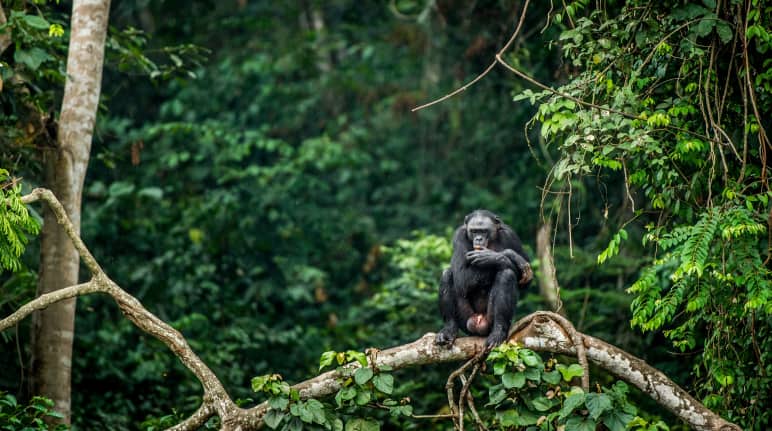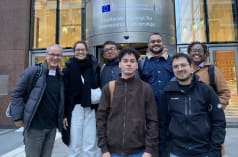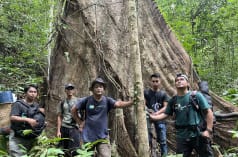DRC: Do not sacrifice Congo's rainforests to the oil industry!
 Bonobos are only found in the Democratic Republic of Congo (© shutterstock.com)
Bonobos are only found in the Democratic Republic of Congo (© shutterstock.com)
The DRC government in Kinshasa is nearing a point of no return: President Tshisekedi wants to sacrifice vast areas of Congo rainforest and peatland for oil. This would be an unmitigated disaster for the climate, biodiversity and local people. Together with our African partner organizations, we can put a stop to these plans.
News and updates Call to actionTo: the President of the Democratic Republic of the Congo, Félix Tshisekedi
“Stop the development of new oil fields in the Democratic Republic of Congo.”
The rainforests of the Congo Basin are home to millions of people and countless animal and plant species, including chimpanzees, bonobos and gorillas. They are a treasure trove of biodiversity and crucial to the fight against climate change.
Despite this, the government of the Democratic Republic of Congo (DRC) began auctioning 27 oil and 3 gas blocks in late July. The blocks cover some of the last remaining intact forests on Earth.
Three of the blocks overlap the Cuvette Centrale peatlands, which are estimated to store 30 billion tons of carbon, the equivalent to one years’ worth of global emissions. The peatlands are so vast and remote that little is known about the biodiversity at stake there. Nine oil blocks overlap protected areas.
More than half of the Congo Basin's peatlands and 60 percent of its rainforest are in the DRC, the country plays a key role in the fight against the climate crisis.
The science is clear: the governments of the world must cut carbon emissions in half within the next eight years.
In his speech at the UN's COP26 conference in Glasgow, President Tshisekedi promoted the vital role of the Congo Basin forests in regulating the global climate and his intention to enhance DRC’s energy mix by "combining several types of energy: biomass, hydro, solar." The cost of not doing so, he said, would be a climate crisis.
The world cannot afford any further expansion of oil and gas. According to the International Energy Agency (IEA), an immediate end to new investment in fossil fuel supply projects is the first step to keep global warming below 1.5°C and achieve global net zero emissions by 2050.
In an alliance of environmentalists from Africa and around the world, we want to keep the oil in the ground and the fossil fuel industry out of the Congo Basin. Please sign our joint petition!
LetterTo: the President of the Democratic Republic of the Congo, Félix Tshisekedi
Your Excellency,
We call on you to cancel plans for the development of 16 oil blocks. Opening up DRC’s forests to oil drilling would be an unmitigated disaster for the climate, biodiversity, human rights and the livelihoods of vulnerable populations living in the areas earmarked for development by the fossil fuel industry.
Yours faithfully,
How the climate and rainforests are linked
Rainforests are complex ecosystems in which a vast number of animal, plant and fungi species are tightly interdependent. They play a major role in the local and global climate: In a process called photosynthesis, plants absorb the greenhouse gas carbon dioxide (CO2) from the air. With the help of water and sunlight, they form sugar and from it other plant building blocks. In doing so, plants sequester carbon in stems, leaves and roots while releasing oxygen into the atmosphere.
According to estimates, rainforests sequester 250 billion tons of CO2, much of it in peat forests. Globally, this is equal to 90 times the man-made greenhouse gas emissions per year. 40 percent of the oxygen in the atmosphere comes from rainforests. While the metaphor of forests as the “lungs of the Earth” does not fit perfectly, it certainly does underscore their vital role.
Rainforests themselves produce a large part of the high year-round rainfall they receive. Evapotranspiration, i.e. the moisture that the plants release through their leaves, is an important aspect here. The forests are hot and humid, but the clouds reflect much of the sunlight back into space – thus cooling the atmosphere. Without this effect, the areas would be even warmer.
As carbon sinks and rainmakers, intact forests play an important role in regulating the climate and are crucial to the fight against catastrophic climate change.
The problem: catastrophic climate change and forest destruction
Rainforests are increasingly unable to act as climate stabilizers: When they are destroyed for plantations, grazing area or mining projects, vast amounts of greenhouse gases are released. For example, forest fires in Indonesia accounted for one-third of total global emissions in 1997. The loss of peat forests is particularly devastating.
According to a study published by Nature, rainforests could tip from carbon sinks to carbon emitters solely due to changing climatic and growth conditions from 2035 onward – thus accelerating catastrophic climate change.
Because of the intricate interdependencies of the rainforest ecosystem, the entire web can suffer if it is damaged in one place. Take the water cycle, for example. If drier periods occur as a result of global climate change – and this is already being observed – the cycle may break down. This can lead to evergreen, lush rainforests becoming grasslands with far lower biodiversity. The local climate would become drier and hotter.
The 18 tipping points in the climate system are particularly ominous: If, for example, climate change in the Amazon region reaches a certain point, the process and the loss of the rainforest in its current form will become unstoppable.
One thing is clear: catastrophic climate change is man-made. 98 percent of the scientists who study climate issues agree. Because the climate is a highly complex system, researchers are constantly discovering new relationships, interpreting data in different ways and revising forecasts. This is completely normal in science. However, the findings of climatologists are becoming increasingly alarming.
The solution: rainforest protection is climate protection
Rainforests must be preserved because they are indispensable as carbon sinks and their further destruction would worsen the impact of catastrophic climate change. Climate protection is therefore rainforest protection and vice versa.
- We need to preserve forests and nature and heal damage. Forests are more than just carbon sinks – they are diverse ecosystems and home to millions of people.
- We need to protect the climate while preserving biodiversity. Catastrophic climate change and extinction are two existential crises that we must tackle together.
- We need to secure and strengthen the rights of indigenous peoples, who are often the forest's best stewards: We call it the rainforest – they call it home.
- We need to fundamentally change our way of life and how we do business: This will mean reducing our consumption of energy, food and raw materials instead of maintaining it by turning to “green products”. We must stop burning fossil fuels.
- We need to reform flawed climate policy: We must end the misguided use of biofuels, especially if they are based on palm oil, soy or sugar cane, and stop burning trees in power plants.
- We reject offset programs as a modern “indulgence trade” in which companies finance environmental protection measures in return for being allowed to pollute. We also reject supposedly more climate-friendly “bridge technologies” like replacing coal with natural gas.
- In the wake of the Covid pandemic, we need to rebuild the economy and society in an environmentally sound way. There must be no economic “stimulus programs” based on old formulas.
At the same time, Covid has shown that we are capable of creating rapid and profound change in the face of an existential crisis.
The government in Kinshasa has repeatedly extended the deadlines for submitting bids for oil and gas concessions.
Environmentalists see this as a positive sign: Corporate interest, especially in the oil fields in the rainforests of Cuvette Central, appears to be low or non-existent. One of the reasons for this is certainly the difficulty of reaching the oil fields are difficult to reach in regions where there are no roads, pipelines or railroads.
The current deadlines:
- Cuvette Centrale (nine blocks): between May 6 and June 17, 2024
Previously, the deadlines for these blocks were between January 22 and March 4, 2024. However, there were apparently too few or no interested parties.
- Tanganyika Graben (11 blocks): between March 11 and April 8, 2024
- Albertine Graben (four blocks): between April 14 and May 7, 2024
However, the three oil fields in the Bassin Côtier near the Atlantic coast and the three gas fields on Lake Kivu are causing serious concern.
- Bassin Côtier oil blocks:
Perenco, an Anglo-French oil company, won the pre-selection for the YEMA II and NGANZI blocks. The company is already active in the country and cooperates with the Congolese state company Sonahydroc.
Notably, Perenco donated four all-terrain vehicles to the Ministry of Oil in July 2023 during the bidding process. The company has been sued in France for environmental damage. It is also being investigated for corruption.
- Lake Kivu gas blocks:
On September 9, 2023, the government in Kinshasa signed contracts with two companies, Alfajiri Energy and Winds Exploration and Production LLC for the Lwandjofu and Idjwi gas concessions, where methane is to be extracted. The deals appear dubious:
Alfajiri Energy is headquartered in a single-family home in the Canadian city of Calgary, the capital of the oil province of Alberta. The company was incorporated only in January 2022, three weeks after the Kinshasa government announced the award of the licenses.
Winds Exploration and Production LLC is incorporated in Houston, Texas. The company’s Certificate of Organization was apparently revoked by the State of Texas in July 2023 for alleged tax violations. As a result, the company would be legally inactive and unable to conduct business there.
Symbion Energy won the contract for the Makelele gas block, but apparently has not yet signed a contract with the government. The company already operates in the Rwandan part of Lake Kivu. Other projects have been or are underway in Nigeria, Iraq, Afghanistan and elsewhere.
Democratic Republic of Congo: Government calls off oil auction!

Great news from the world’s second largest rainforest: The government of the Democratic Republic of Congo (DRC) canceled the auction of 27 oil concessions! Local communities and environmental activists, including Rainforest Rescue, fought the project tooth and nail. However, the Ministry of Oil is considering a new attempt, so our campaign will continue.
DRC: Expulsion of the Batwa people ruled unjust
The African Commission on Human and Peoples’ Rights has issued a historic ruling in favor of the Indigenous Batwa and against “fortress conservation”: The Batwa’s human rights were violated when they were forcibly evicted during the creation of the Kahuzi-Biega National Park (PNKB) in the Democratic Republic of Congo (DRC). They have the right to return to their ancestral lands.
Forest guardians excluded from Three Basins Summit
Civil society joint statement to the Three Basins Summit, Amazon – Congo – Borneo – Mekong – Southeast Asia in Brazzaville, Republic of Congo
DRC: Fostering community trust with schools
“And what do you do for us people?” is a question sometimes asked of environmentalists working in remote, poverty-stricken areas. In the heart of the Congo Basin, Rainforest Rescue supports school projects that go hand in hand with bonobo conservation.
Panama: Santa Maria River communities establish protected area
For more than ten years, farmers, environmental activists and scientists had fought for a law that would protect the Santa Maria River basin in Panama. They are now celebrating a huge success.
DR Congo officially recognizes the rights of Indigenous people
The Democratic Republic of Congo (DRC) has passed a new law recognizing the rights of Indigenous people. This is a major step forward, especially for the Congo Pygmy peoples, who have long experienced discrimination, poverty and violence. It remains to be seen how the law will be put into practice, however.
The looming threat of fossil fuel companies in Africa
The fossil fuel industry is pushing hard into Africa, and a new study by Rainforest Foundation UK and Earth InSight shows the full extent of the threat. In the Congo Basin alone, the endangered rainforest area is almost twice the size of Germany.
DR Congo: “We’ll keep our forests, you keep your dollars!”
The government of the Democratic Republic of the Congo (DRC) has kept its people in the dark about its plans to permit oil exploration on a vast scale. According to a Greenpeace report backed by Rainforest Rescue, a majority of rural people oppose the sellout of the country's forests out of concern for the environment.
27 oil and 3 gas blocksThe government in Kinshasa has published detailed information about the oil and gas blocks.
Companies have until February 1, 2023 to place their bids (October 10, 2022 for the gas blocks at Kivu Lake.) The concessions are scheduled to be awarded on June 30, 2023.
Cuvette Centrale peatlandsAt 145,500 square kilometers, the peatlands of the Cuvette Centrale (roughly translated as Central Basin) are larger than England.
its rainforestThe Congo Basin rainforest is the second largest contiguous tropical forest in the world after the Amazon rainforest. The DRC is home to 60 percent of it. The remaining parts are located in the Republic of Congo, the Central African Republic, Gabon, Equatorial Guinea and Cameroon.
promoted the vital roleThe contradiction of drilling for oil in peatlands while presenting itself as a "solution country" is particularly glaring as the DRC will be co-hosting the next UN Climate Change Conference, COP27, with Egypt.
keep global warming below 1.5°C
The DRC government would not be solely responsible for this, but also involved oil companies, banks, insurance companies and the consumers of the oil, among others.
Beyond the extraction of oil, roads, bridges and workers' settlements would lead to the destruction of rainforest.
In addition to our partners Réseau CREF in Goma and RIAO-RDC in Kinshasa, the alliance includes numerous other Congolese, African and international organizations such as
350.org groups in Africa
This petition is also available in the following languages:
Help us reach 150,000:










